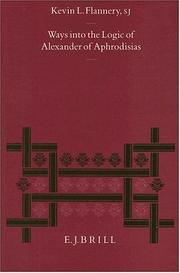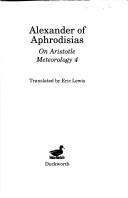| Listing 1 - 10 of 24 | << page >> |
Sort by
|
Book
Year: 1970 Publisher: Padova : Antenore,
Abstract | Keywords | Export | Availability | Bookmark
 Loading...
Loading...Choose an application
- Reference Manager
- EndNote
- RefWorks (Direct export to RefWorks)
Book
Year: 1942
Abstract | Keywords | Export | Availability | Bookmark
 Loading...
Loading...Choose an application
- Reference Manager
- EndNote
- RefWorks (Direct export to RefWorks)
Book
Year: 1976 Publisher: Leiden Brill
Abstract | Keywords | Export | Availability | Bookmark
 Loading...
Loading...Choose an application
- Reference Manager
- EndNote
- RefWorks (Direct export to RefWorks)
Book
Year: 1929 Publisher: München Verlag der Bayerischen Akademie der Wissenschaften
Abstract | Keywords | Export | Availability | Bookmark
 Loading...
Loading...Choose an application
- Reference Manager
- EndNote
- RefWorks (Direct export to RefWorks)
Philosophy --- Alexander of Aphrodisias --- Themistius --- Aristotle --- Johannes Philoponus
Book
ISBN: 9789004686014 9004686010 9004686029 9789004686021 Year: 2024 Publisher: Leiden, The Netherlands : Brill,
Abstract | Keywords | Export | Availability | Bookmark
 Loading...
Loading...Choose an application
- Reference Manager
- EndNote
- RefWorks (Direct export to RefWorks)
"This volume sheds new light on Alexander of Aphrodisias' On Mixture and Growth as an intelligent and carefully crafted rebuttal of Stoic blending, which Alexander regarded as the closest rival of his own brand of hylomorphism. The authors explore Alexander's dialectical method and determine the precise character of the Stoic theory he attacks. The problematic notions of mutual co-extension and infinite division appear in their proper context, while the successive stages of the process of blending are carefully distinguished from the resulting state of the blend. In this perspective the discussion of growth that closes Alexander's work finds its natural place"-- Provided by publisher.
Mixing (Philosophy). --- Stoics. --- Alexander, --- Mixing (Philosophy) --- Stoics --- Alexander, - of Aphrodisias --- Stoïcisme.

ISBN: 9004044027 9004320490 9789004044029 9789004320499 Year: 1976 Volume: v. 28 Publisher: Leiden Brill
Abstract | Keywords | Export | Availability | Bookmark
 Loading...
Loading...Choose an application
- Reference Manager
- EndNote
- RefWorks (Direct export to RefWorks)
Stoics --- Physics --- Peripatetics --- Mixing (Philosophy) --- Philosophy, Ancient --- Stoïcisme --- Physique --- Péripatéticiens --- Philosophie ancienne --- Philosophy --- Early works to 1800 --- Philosophie --- Ouvrages avant 1800 --- Alexander, --- Mixing --- Ethics --- Blending --- Chemical engineering --- Fluid dynamics --- Hydrodynamics --- Alexander of Aphrodisias --- Mixing. --- Stoics. --- Alexander Aphrodisaeus --- Alexander Aphrodisiae --- Alexander van Aphrodisias --- Alexandre d'Aphrodise --- Alexander --- Stoïcisme --- Péripatéticiens --- De mixtione (Alexander, of Aphrodisias) --- Alexander, - of Aphrodisias - Peri kraseōs kai auxēseōs

ISBN: 9004099980 9004320849 9789004099982 9789004320840 Year: 1995 Volume: 62 Publisher: Leiden: Brill,
Abstract | Keywords | Export | Availability | Bookmark
 Loading...
Loading...Choose an application
- Reference Manager
- EndNote
- RefWorks (Direct export to RefWorks)
Ways into the Logic of Alexander of Aphrodisias is intended to give an overview of the logic of Alexander of Aphrodisias (fl. early Third century A.D.). Since much of what might be called Alexander's logic is simply Aristotelian logic, instead of engaging in point-by-point analysis, it takes up three themes, one from each of the main areas of traditional logic: the assertoric syllogistic, the modal syllogistic, and the area of metalogical concerns. It provides insight not only into Aristotle's logical writings themselves but also into the tradition of scholarship which they spawned: the ideas and analyses of such figures as Theophrastus of Eresus, John Philoponus and (more recently) Jan Lukasiewicz.
Ancient logic --- Antieke logica --- Logic [Ancient ] --- Logica [Antieke ] --- Logica van de Oudheid --- Logique ancienne --- Logique de l'Antiquité --- Logic, Ancient --- Alexander, --- Logic, Ancient. --- Alexander of Aphrodisias --- Alexander Aphrodisaeus --- Alexander Aphrodisiae --- Alexander van Aphrodisias --- Alexandre d'Aphrodise --- Alexander --- Alessandro, --- Alexandre, --- Alexandros, --- Aphrodisæus, Alexander --- Iskandar al-Afrūdīsī --- אלכסנדר, --- Ἀλέξανδρος, --- Alexander, - of Aphrodisias. --- Iskandar al-Afrūdīs

ISBN: 1472558057 0715626841 9781472558053 9781472501851 1472501853 9780715626849 1472551702 Year: 1996 Publisher: London: Duckworth,
Abstract | Keywords | Export | Availability | Bookmark
 Loading...
Loading...Choose an application
- Reference Manager
- EndNote
- RefWorks (Direct export to RefWorks)
Aristotle's Meteorology Book 4 provides an account of the formation of minerals, metals and other homogeneous stuffs. Eric Lewis argues that, in doing so, it offers fresh insight into Aristotle's concept of matter. The four elements (earth, air, fire and water) do have matter, and their matter is the contraries - hot and cold, moist and dry. Lewis further argues that in the text translated here, the only extant ancient commentary on the Meteorology , Alexander of Aphrodisias supports this interpretation of Aristotle. Such a conception of matter complements the account given at an earlier point
Aristotle. Meteorologica. --- Meteorology -- Early works to 1800. --- Earth & Environmental Sciences --- Meteorology & Climatology --- Meteorologica (Aristoteles). --- Meteorology --- Meteorology. --- Aristoteles, --- Aristotle. --- Aristotle <384-322 B.C> / Meteorologica. --- Meteorologica (Aristotle). --- Contributions in meteorology --- Alexander, --- Meteorology - Early works to 1800 --- Aristotle. - Meteorologica. - Book 4. --- Alexander, - of Aphrodisias - Contributions in meteorology --- Alexander, - of Aphrodisias
Multi
ISSN: 18644805 ISBN: 9783110186789 9783110216462 3110216469 1283398540 9781283398541 9786613398543 6613398543 3111730921 9783111730929 3110186780 Year: 2011 Volume: v. 1 Publisher: Berlin Boston De Gruyter
Abstract | Keywords | Export | Availability | Bookmark
 Loading...
Loading...Choose an application
- Reference Manager
- EndNote
- RefWorks (Direct export to RefWorks)
Der heute verlorene Kommentar von Alexander aus Aphrodisias (ca. 200 n. Chr.) zur Physik des Aristoteles ist eines der wichtigsten Werke der Antike: beeinflusste er doch als Quelle sowohl die neuplatonischen Kommentatoren zu Aristoteles (vor allem Simplikios) als auch – vermittelt durch die Zitate bei Averroes – die Naturphilosophie des Mittelalters. Die von Marwan Rashed präsentierte Erstedition und Untersuchung der nahezu 700 byzantinischen Scholien, die erst jüngst in zwei Pariser Handschriften vom Anfang des 14. Jahrhunderts (Paris. Suppl. gr. 643, Paris. gr. 1859) entdeckt wurden, erlauben eine genauere Rekonstruktion der physikalischen Lehren Alexanders und tragen zugleich zum besseren Verständnis der Geschichte des Aristotelismus und der vor-klassischen Physik bei. Auch finden sich beispielsweise neue Präzisierungen seiner Lehre von Ort und Zeit ebenso wie seines Zugangs zur Bewegung des ‚Ersten Bewegers‘. Die byzantinischen Scholien ermöglichen zum ersten Mal, die völlige Abhängigkeit des Simplikios von seinem Vorgänger festzustellen und, noch wichtiger, die Transformationen, die er an der peripatetischen Naturphilosophie unternahm, um sie mit einem gewissen Platonismus in Einklang zu bringen.
Science, Ancient --- Philosophy of nature --- Sciences anciennes --- Philosophie de la nature --- Early works to 1800 --- Ouvrages avant 1800 --- Aristotle. --- Alexander, --- Ancient science --- Science, Primitive --- Science --- Nature --- Nature, Philosophy of --- Natural theology --- History --- Philosophy --- Alessandro, --- Alexandre, --- Alexandros, --- Aphrodisæus, Alexander --- Iskandar al-Afrūdīsī --- אלכסנדר, --- Ἀλέξανδρος, --- Science, Ancient. --- Philosophy of nature. --- Aristotle. - Physics. - Book 4-8 --- Alexander, - of Aphrodisias --- Alexander of Aphrodisias.
Book
ISBN: 9782503588278 9782503588285 2503588271 Year: 2021 Publisher: Turnhout: Brepols,
Abstract | Keywords | Export | Availability | Bookmark
 Loading...
Loading...Choose an application
- Reference Manager
- EndNote
- RefWorks (Direct export to RefWorks)
The greatest ancient interpreter of Aristotle, Alexander of Aphrodisias (fl. 200 AD) exerted a profound and enduring influence upon philosophy that extended from Boethius until the modern era. Alexander's interpretations laid the foundation for multiple philosophical views which were promoted as quintessentially Aristotelian by both Islamic and Latin thinkers throughout the Middle Ages. In the Renaissance, the University of Padua, a leading center of philosophical education and thought, established a scholarly tradition named "Alexandrinism" after him.
Peripatetics --- Philosophy, Ancient --- Philosophy, Medieval --- Islamic philosophy --- Philosophy, Renaissance --- Influence. --- Greek influences. --- Alexander, --- Alexander of Aphrodisias --- anno 500-1499 --- anno 1500-1599 --- Philosophie de la Renaissance. --- Philosophie médiévale. --- Philosophy, Medieval. --- Philosophy, Renaissance. --- Aristotle --- Accattino, Paolo, --- Alexander Aphrodisiensis
| Listing 1 - 10 of 24 | << page >> |
Sort by
|

 Search
Search Feedback
Feedback About UniCat
About UniCat  Help
Help News
News